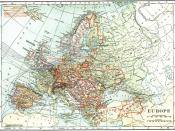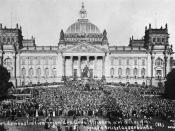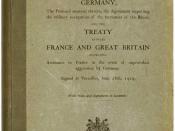The origins of the Second World War are one of the most popular topics in twentieth century history. Ever since the war came to an end, controversy has surrounded its outbreak. It is important to remember, however, that the Second World War had short-term as well as long-term causes, and that these were not so simple and clear-cut as it may perhaps seem at first.
The German Fuhrer, Hitler, used realpolitik and Machiavellian tactics to further his cause in that he plotted the destruction of Czechoslovakia and the invasion of Poland very much in advance. Politically and diplomatically he made sure that Germany seemed reasonable and that she held the 'higher moral ground', as demonstrated by his making it seem like Germany had been dealt an "unbearable provocation" by Czechoslovakia to which he had to respond. In doing this he also made sure Czechoslovakia would be on her own, as indeed the Czechs, the French and the British succumbed to his (deliberately increasing, as he wanted negotiations to fail) demands.
It can therefore be seen that Hitler viewed war as an acceptable ideological vehicle and tool of foreign policy. He planned for war, as can plainly be seen from evidence such as his books Mein Kampf (1924-25) and the Secret Book (1928), as well as from the Hossback Memorandum. Similarly, a German Foreign secretary quoted him as saying (in a confidential meeting) that he would "destroy Czechoslovakia". Hitler was thus more than willing to use aggressive war-making to achieve his goals, which were the revision of the Versailles Treaty, Anschluss, the unification of all German-speaking peoples, and Lebensraum, the attainment of "living space" in Eastern Europe (including the USSR).
In this we can see that Germany was certainly pushing for war against Eastern European countries in the late 1930s.
Some of the arguments presented by Hitler and others for invading some Eastern European countries do bear some weight in this analysis of the causes of the war, however. Such arguments include: that Versailles was unjust and a 'diktat' imposed by the victorious powers on a beaten Germany.
That Czechoslovakia was a democratic state built on the Treaty of Versailles and as such was wholly artificial, not to mention that it jutted into Germany in a way Hitler found menacing and labelled an "aircraft carrier" (as it could be used as a base from which to stage an invasion of Germany, not to mention the fact that it had a potent air force). Also, that Germany lost many of its German citizens to Czechoslovakia and other countries (such as Poland), which ran contrary to Hitler's goal of Anschluss.
It is often said that the Second World War was really a continuation of the first. This is essentially because the second conflict arose partly as a result of the Treaty of Versailles, which was intended to punish Germany for allegedly having started the Great War. Many Germans were resentful of the 1919 Treaty of Versailles, regarding it as a public humiliation and a defeat, not to mention the terms of the treaty itself, which included that Germany was to accept full responsibility for the war, which meant the country had to pay huge compensations which ranged in the billions. The Dawes and Young Plans illustrate this perfectly: in 1930 the Young Plan reduced further payments to US$26,350,000,000 to be paid over a period of 58ý years; which no doubt would have seemed astronomical to German observers at the time. These reparations crippled German economy, and to many they seemed designed to keep it that way.
The economy wasn't the only thing being crippled; however, as Germany's military forces were also severely restricted: the German army was to number no more than 100,000 men, there was to be no tanks or heavy artillery and no German General Staff. The German Navy was restricted to 15,000 men and no submarines (because of the Great War U-Boat scare) while the fleet was limited to six battleships of less than 10,000 tons, six cruisers and 12 destroyers. Germany was not permitted an air force or Luftwaffe. Finally, Germany was explicitly required to retain all enlisted men for 12 years and all officers for 25 years, so that only a limited number of men would have military training.
13% of German territory was also 'confiscated,' going to neighbouring countries (a significant number of the German population was thus also lost in the process), as for example it was stripped of its overseas colonies in Africa, Alsace-Lorraine was taken back by France, some land was given to Poland, some went to Czechoslovakia, the Rhineland was to be occupied by the Allies for 15 years after which the Germans were forbidden to station troops there, etc. An example of this division of former German land that particularly irritated the Germans (especially Hitler) was the strip of land known as the Polish Corridor, which jutted into Germany 'menacingly' and cut off East Prussia from the rest of Germany.
The policies implemented in the peace treaty of 1919 were largely viewed as not only reparations but also as vengeful measures, especially on the part of France, which wanted retribution for the vast amount damage it had suffered in the Great War.
A view can be taken that a backlash or negative repercussions from these overbearing restrictions were thus inevitable, and that in a way the Versailles treaty contributed to the rise to power of the Nazis and thus indirectly precipitated World War Two.
This view, however, can be disputed, as many moves were also made in Germany's favour in the years between World War One and World War Two:
The commissions tasked with supervising disarmament were withdrawn and the reparations payments were reduced (Dawes and Young Plans) and eventually cancelled, to mention just some of these changes. It is also worth noting that the financial burden of reconstruction was shifted from Germany to the countries that were actually occupied and devastated by the war. Some historians say that Germany's industry and economic potential were also less affected than those of other European countries, and that although weakened by the war, Germany was still stronger compared to her enemies in 1919 than she had been in 1913.
It is also said by some that the creation of Poland shielded Germany from her greatest opponent, Russia, and thus that Poland could be considered an advantage to Germany. Poland also helped prevent the spread of Bolshevik communism into Europe and especially Germany, due to the Warsaw Battle of 1920.
The League of Nations is also partly to blame for preventing the outbreak of the Second World War. Many of its policies failed (the Geneva Disarmament Conference is an example of this), and some actually hindered its work (such as disarmament, as it robbed the League of military support from Britain and France), and it was unable to provide effective resistance to aggressions such as Abyssinia and Manchuria, for instance. In the case of the former, the League's attempted measures against Italy failed (it banned the selling of arms, which actually hurt Abyssinia more than Italy, and undertook other equally ineffective economic sanctions). The secret Hoare-Laval pact conducted between the British, the French and the Italians undermined the League's efforts considerably. As a result it was largely discredited as it showed the League's powerlessness when faced with a great power, set a dangerous precedent and paved the way for Hitler. Germany was later able to start re-armament (completely disregarding the treaty of Versailles) and even to re-occupy the Rhineland, all without opposition from the League of Nations. Historians witnessed a return to old diplomacy as a result of the League's failures and because of the power vacuums left by the USSR and the USA with their isolation. Diplomacy in the 1930s hence became very complex and returned to the style of old, once again setting a climate of suspicion and uncertainty.
The League of Nations cannot take the entire blame for its failure to prevent war, however, since it seemed by this time that major powers (such as Britain, France, Germany, Italy, Japan) were unwilling to cooperate with the League, and as a mediator or umpire the League could only go so far if the member states themselves refused to be mediated. After all, the League could hardly force countries to forge alliances and to get along with each other...
The USSR played an active role in causing the Second World War as well, as exemplified by the Nazi Soviet pact. This pact entailed that Germany and Russia would not go to war for 10 years, and that if Germany should attack Poland it would be split in half between them (the Northern part going to the USSR), not to mention the economic agreement which involved the Soviets selling raw materials to the Germans in exchange for finished products such as machinery. This essentially meant that if Germany was to go to war against the West over Poland, the Soviets were guaranteeing not to enter war, thus ensuring that Germany would not be facing a war on two fronts. This may have precipitated war in that it made Hitler much bolder, knowing he would not have to face his main foe, the Soviet Union, over Poland.
A general appeasement policy was also at fault, a principle that Prime Minister Neville Chamberlain particularly believed in. This appeasement policy was conducted to avoid war at all costs and to avoid a repetition of the First World War.
It has been argued that if an overzealous war enthusiasm had produced the mass slaughter of World War I, then the resulting determination to avoid war at all costs in the 1930s proved equally counterproductive, with Europe's failure to oppose Hitler leading him to believe that he could do as he pleased with little or no consequences or response from other countries. In this view the delay caused by appeasement increased the number of people killed when war ultimately became unavoidable. Another view argues that there were elements within the German Army which would have removed Hitler from power if he had backed down in the face of Allied opposition. Finally, some have argued that had the Allies put a hard line on Czechoslovakia, Germany would have had less time to rearm and the resulting war would have been less destructive than that which we have known.
Appeasement, however, can be justified in that Britain for instance had many other threats to face at that time, such as Italy in the Mediterranean and Japan in the Far East, and thus it was probably not easy to find a viable solution other than appeasement. They were also unsure until 1939 whether self-governing British states such as South Africa and Canada would join Britain in an eventual war. The fear was that a war could split the British Empire. Chamberlain, who was already a pacifist by conviction at any rate, was also informed that if a war were to be declared German air raids might kill or injure two million civilians in the first year of the war. It is more than possible that such information swayed him completely in favour of appeasement. Hence it can be argued that the international climate of the 30s created the conditions for war.
In addition the Wall Street crash of 1929 and the ensuing global depression contributed to the general instability. States turned inward as the effects of global depression hit their countries, as it made them less concerned with international politics and more with their domestic troubles. This evidently contributed to the deterioration of international goodwill and diplomatic cooperation between political powers.
Many in Germany saw as the solution to the depression the acquisition of new territory, which would provide valuable raw materials, contribute to Germany's exports market, and if nothing else distract the German population from domestic problems (a tactic used many times by governments throughout history). Some actually believe the latter to be the main driving force behind Hitler's heightened aggressiveness in the late 30s, and perhaps what triggered the onset of World War II...
In conclusion, the question raises many complex issues, and even the most diverging views at least agree on the fact that there were several responsible parties, the most obvious of which is Nazi Germany. As described above the war was Germany's fault to a certain extent but other countries, such as Britain, France and Russia, which are rarely mentioned as bearing any responsibility for the outbreak of World War II, played decisive roles in creating the situation that made the war inevitable.



To what extent was Germany responsible for WWII
Very well presented set of argument, analysis, you have clearly shown your skills in debate and backing your statements with firm analysis. You argued that their were long term and short term crisis which had led to the war, and that Germany wasn't the only blame for it.
Your arguments against Germany for causing the war was mainly to blame Britain, France and Russia in their actions in the Treaty of Versailles, Appeasement, League of Nations (Geneva Disarmament Conference) while on the hand, Hitler's aggressive fascists Germany proved extremely gruesome as shown with their attack on Poland and intimidating stance when joined with powerful states such as Italy and Japan. WWII was almost inevitable and the events of the Wall Street crash in 1929 wasn't helpful either in stopping the bloody events that followed.
Well-composed essay
9/10
1 out of 1 people found this comment useful.